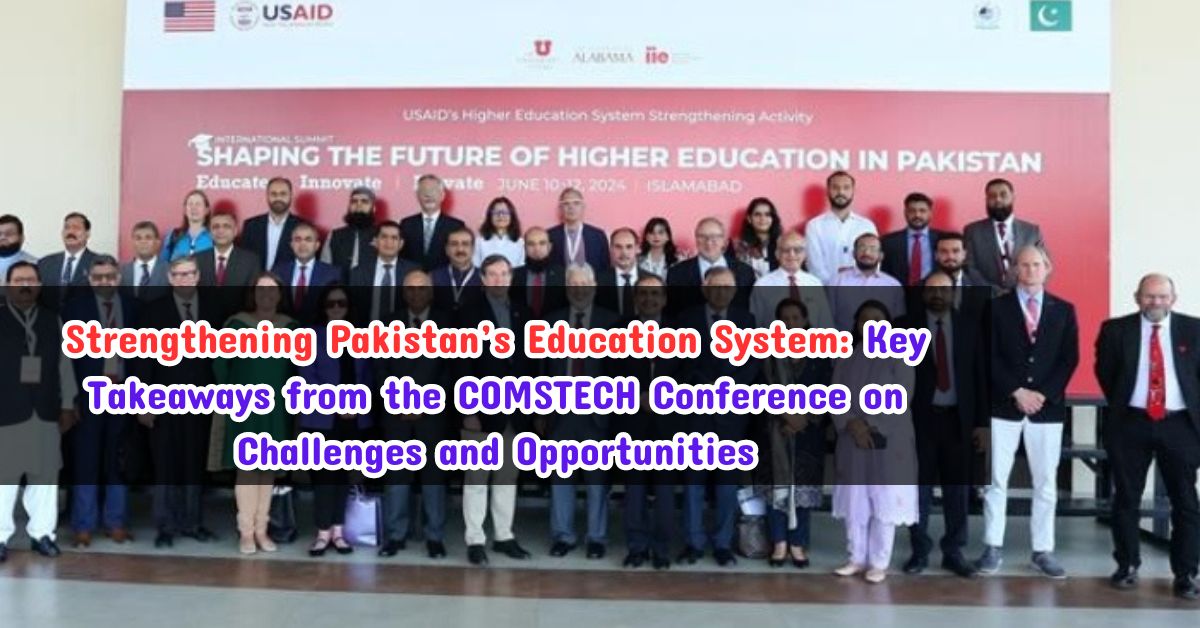ISLAMABAD, OCT 9 (APP/DNA): The International Conference on “Education System Strengthening Challenges and Opportunities – A 20-Year Retrospective” concluded recently at COMSTECH, Islamabad. Organized by Manhattan Strategy Group (MSG), a US-Pakistani development organization, the conference brought together diverse stakeholders to address Pakistan’s education system’s pressing challenges.
A Vision for the Future
Federal Minister for Planning, Development, and Special Initiatives, Prof. Ahsan Iqbal, inaugurated the conference, underscoring the pivotal role of the diaspora in Pakistan’s development. “It is inspiring to see the Pakistani diaspora, led by the Manhattan Strategy Group (MSG), focus on education,” Iqbal stated. He emphasized the need to incorporate artificial intelligence and digital education skills into the curriculum, especially for teachers, as Pakistan moves towards an era dominated by technology.
Also Read: The Secret Ingredient to Career Success: Skill Development
Alarming Education Statistics
During the conference, experts highlighted the critical issues plaguing Pakistan’s education system. Over 26.2 million children remain out of school, with girls accounting for 53% of that number. Shockingly, more than 60% of children aged three to five lack access to pre-primary education. These statistics call for immediate action and innovative solutions to close the education gap in Pakistan.
Key Discussions: Foundational Learning & Workforce Development
The conference featured two-panel discussions led by education and policy experts:
- Foundational Learning and Systems Strengthening: This panel delved into the challenges of early education, teacher training, and improving foundational skills across all levels. Panelists stressed the importance of quality teacher training and system-wide reforms to establish a solid educational foundation.
- Youth Workforce for Green Skills, Science, Technology, and Innovation: The second panel focused on preparing the youth for a sustainable future. Experts highlighted the need for Pakistan to develop a workforce skilled in green technologies, STEM fields, and innovative practices.
Also Read: The Ultimate Student Survival Guide: Essential Tips to Thrive in School
Collaboration Across Sectors
Keynote speakers such as Mr. Mohyuddin Ahmad Wani, Secretary of the Ministry of Federal Education and Professional Training, and Prof. Dr. Mukhtar Ahmed, Chairman of the Higher Education Commission, emphasized the need for cross-sector collaboration. They discussed how partnerships with private sector organizations, international agencies, and the Pakistani diaspora could drive meaningful change in the education sector.
The Role of MSG and Global Collaboration
Shezad Habib, President of MSG, highlighted the organization’s commitment to strengthening education in Pakistan. “Education is the cornerstone of sustainable development. This conference serves as a platform for collaborative action, bringing together diverse stakeholders to tackle Pakistan’s educational challenges,” he said.
Also Read: Addressing Pakistan’s Education Crisis: Why Quality Education is the Key to Progress
Government Initiatives: Building a Brighter Future
Prof. Ahsan Iqbal announced that the Pakistani government is establishing a national institution to train teachers across the country, focusing on preparing educators to meet modern demands. This institution will help foster digital literacy and AI skills, which are critical to equipping students for future challenges.
Moving Forward: Key Takeaways and Future Goals
The conference highlighted several takeaways:
- Focus on Technology in Education: Integrating digital and AI skills in the curriculum, especially in teacher training, is essential to keep pace with global advancements.
- Prioritize Early Education: Providing accessible early education, particularly for young girls, can bridge gaps and promote inclusivity.
- Enhance Cross-Sector Collaboration: Partnerships among the government, private sector, NGOs, and international stakeholders are vital for sustainable educational reforms.
- Invest in Green Skills and STEM: By focusing on green skills and STEM education, Pakistan can prepare its youth for global demands in innovation and sustainability.
Also Read: Discover Proven Learning Techniques to Enhance Skill Acquisition for Lifelong Success
As the conference wrapped up, the participants echoed the need for sustained efforts, continued dialogue, and collaborative initiatives to drive progress in Pakistan’s education sector. With the support of organizations like MSG and the involvement of key government officials, the future holds promise for a strengthened and inclusive education system in Pakistan.
